Exploring Theories of Social Change: Conflict, Economy, and Technology
VerifiedAdded on 2020/05/04
|11
|2882
|70
Essay
AI Summary
The essay provides an in-depth analysis of various theories of social change proposed by scholars such as Dahrendorf, Veblen, Ogburn, and others. It emphasizes conflict theory's role in societal transformation, illustrating how economic disparities or power struggles can lead to significant changes. Additionally, the essay discusses technological determinism, highlighting Ogburn's perspective on technology as a primary agent of change that reshapes social structures and interactions. Furthermore, it explores economic theories of social change, including Veblen’s analysis of capitalism and its influence on societal norms and values. The essay concludes by arguing that controlling these factors is impractical, suggesting that social change is an inevitable aspect of human societies.
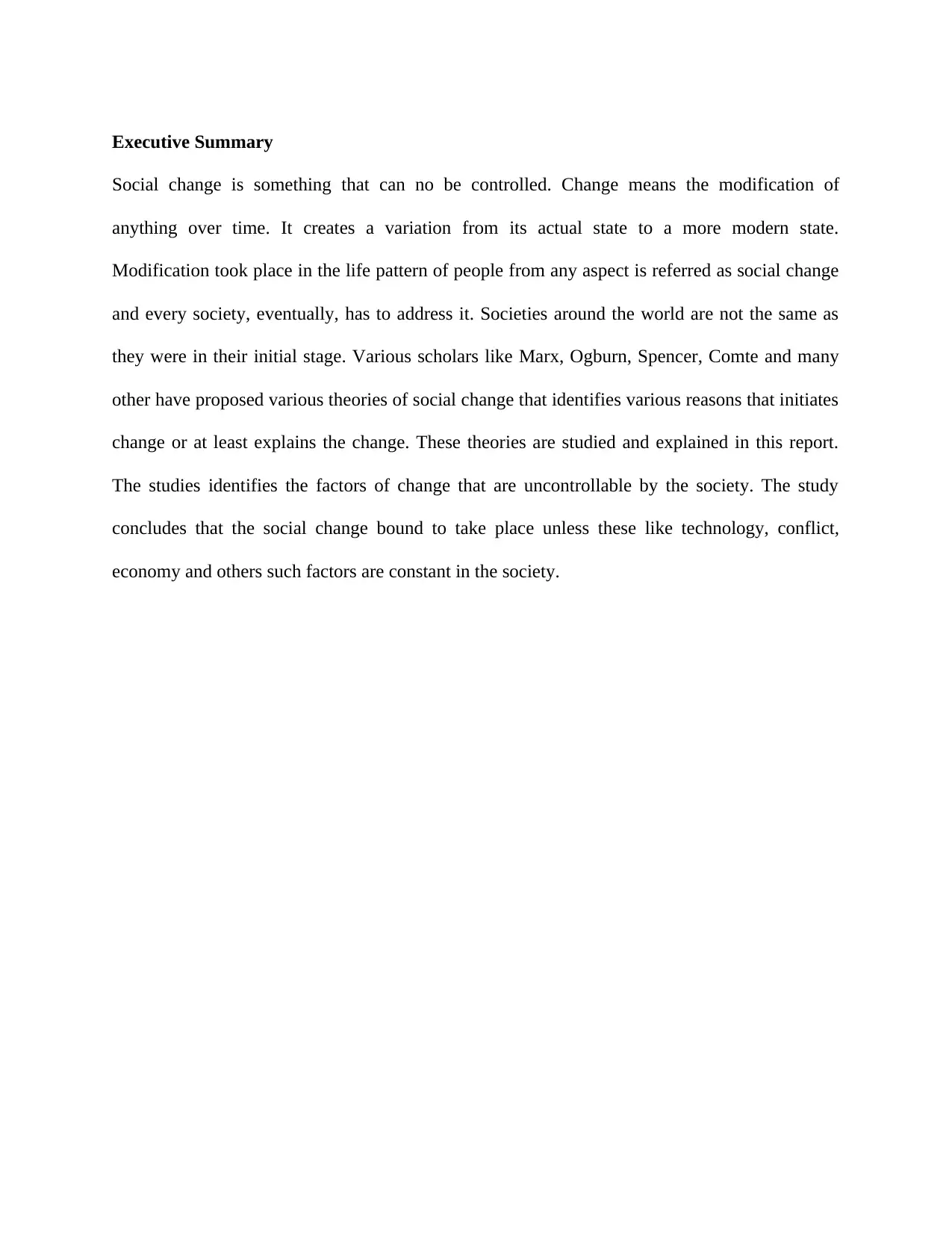
Executive Summary
Social change is something that can no be controlled. Change means the modification of
anything over time. It creates a variation from its actual state to a more modern state.
Modification took place in the life pattern of people from any aspect is referred as social change
and every society, eventually, has to address it. Societies around the world are not the same as
they were in their initial stage. Various scholars like Marx, Ogburn, Spencer, Comte and many
other have proposed various theories of social change that identifies various reasons that initiates
change or at least explains the change. These theories are studied and explained in this report.
The studies identifies the factors of change that are uncontrollable by the society. The study
concludes that the social change bound to take place unless these like technology, conflict,
economy and others such factors are constant in the society.
Social change is something that can no be controlled. Change means the modification of
anything over time. It creates a variation from its actual state to a more modern state.
Modification took place in the life pattern of people from any aspect is referred as social change
and every society, eventually, has to address it. Societies around the world are not the same as
they were in their initial stage. Various scholars like Marx, Ogburn, Spencer, Comte and many
other have proposed various theories of social change that identifies various reasons that initiates
change or at least explains the change. These theories are studied and explained in this report.
The studies identifies the factors of change that are uncontrollable by the society. The study
concludes that the social change bound to take place unless these like technology, conflict,
economy and others such factors are constant in the society.
Paraphrase This Document
Need a fresh take? Get an instant paraphrase of this document with our AI Paraphraser
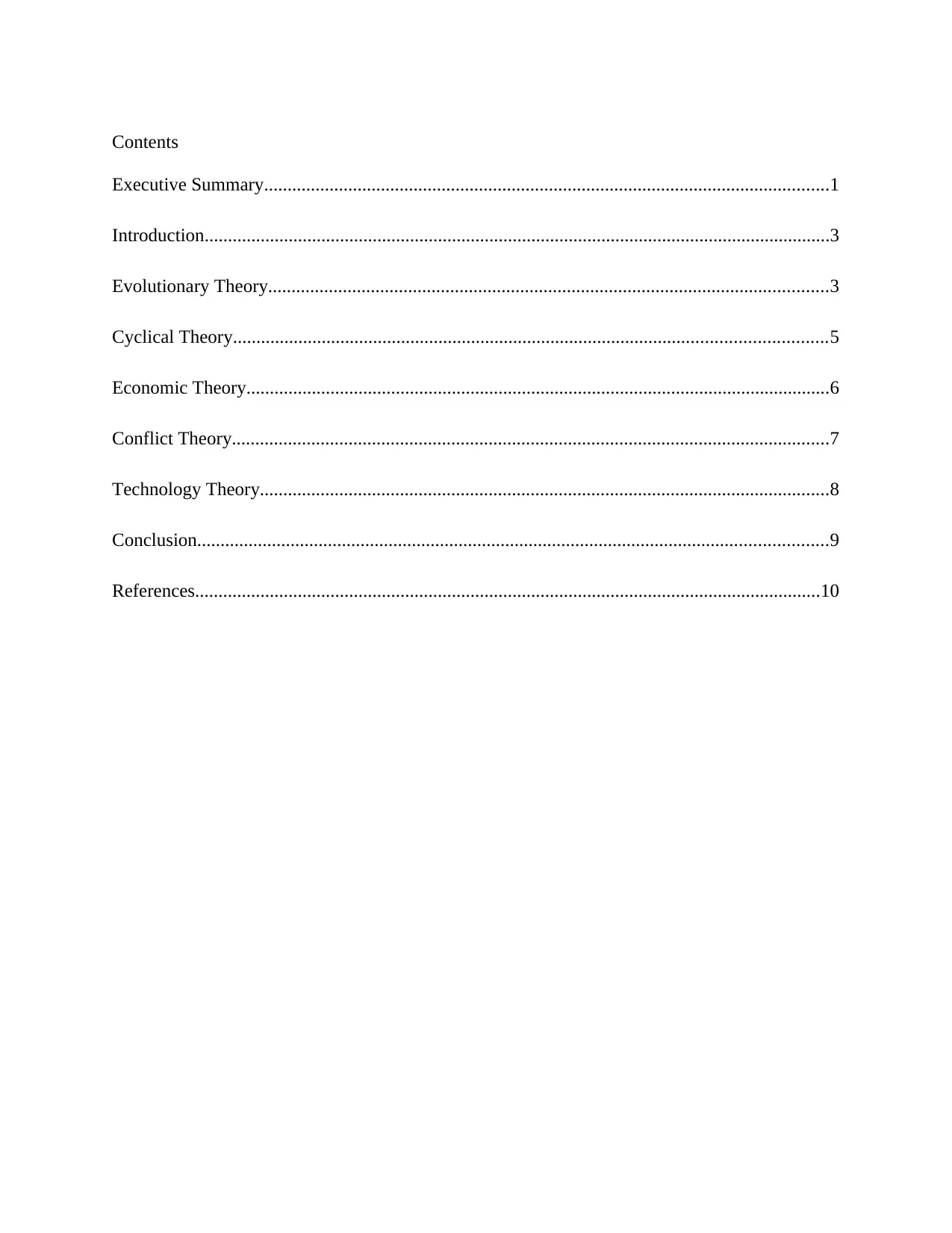
Contents
Executive Summary.........................................................................................................................1
Introduction......................................................................................................................................3
Evolutionary Theory........................................................................................................................3
Cyclical Theory...............................................................................................................................5
Economic Theory.............................................................................................................................6
Conflict Theory................................................................................................................................7
Technology Theory..........................................................................................................................8
Conclusion.......................................................................................................................................9
References......................................................................................................................................10
Executive Summary.........................................................................................................................1
Introduction......................................................................................................................................3
Evolutionary Theory........................................................................................................................3
Cyclical Theory...............................................................................................................................5
Economic Theory.............................................................................................................................6
Conflict Theory................................................................................................................................7
Technology Theory..........................................................................................................................8
Conclusion.......................................................................................................................................9
References......................................................................................................................................10
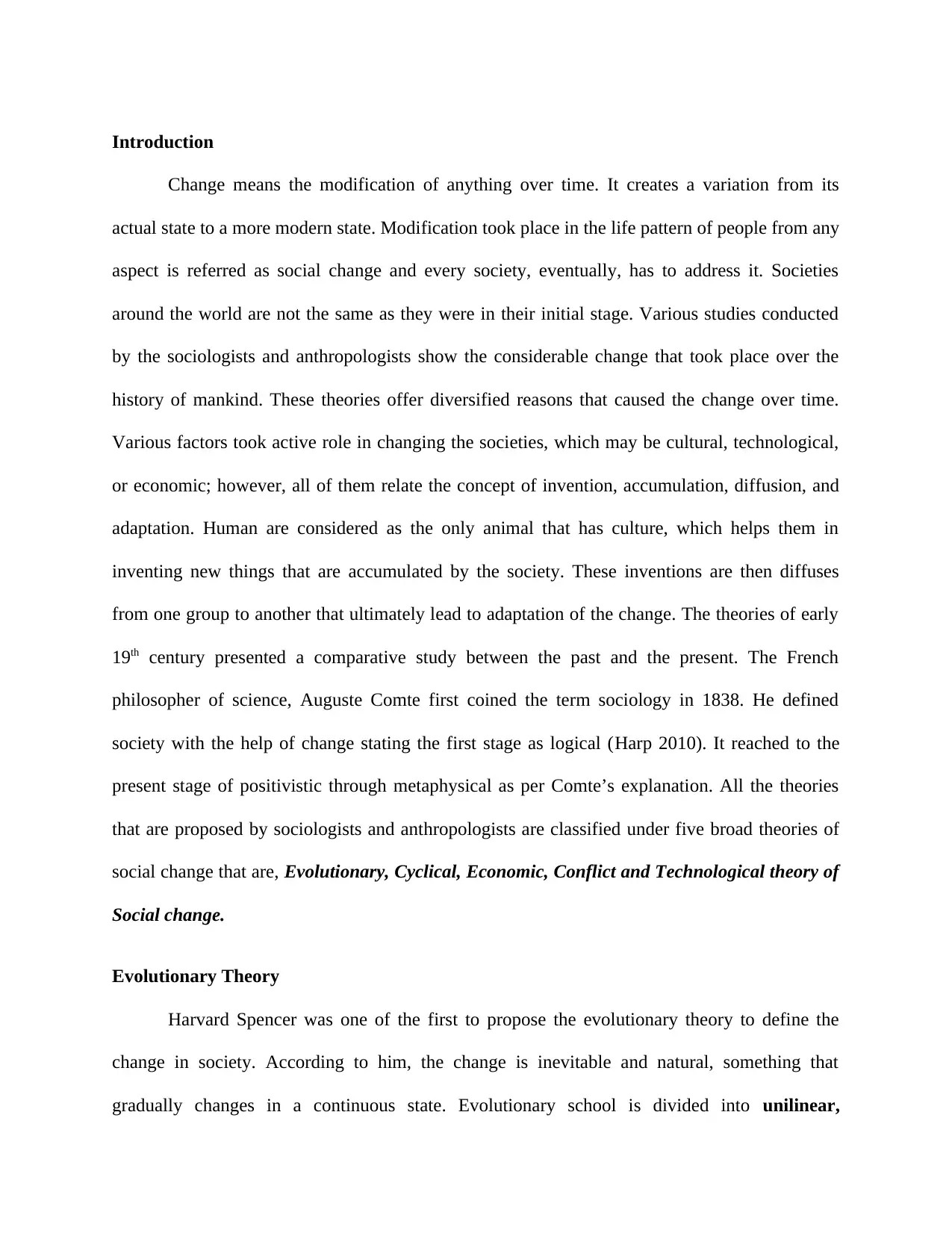
Introduction
Change means the modification of anything over time. It creates a variation from its
actual state to a more modern state. Modification took place in the life pattern of people from any
aspect is referred as social change and every society, eventually, has to address it. Societies
around the world are not the same as they were in their initial stage. Various studies conducted
by the sociologists and anthropologists show the considerable change that took place over the
history of mankind. These theories offer diversified reasons that caused the change over time.
Various factors took active role in changing the societies, which may be cultural, technological,
or economic; however, all of them relate the concept of invention, accumulation, diffusion, and
adaptation. Human are considered as the only animal that has culture, which helps them in
inventing new things that are accumulated by the society. These inventions are then diffuses
from one group to another that ultimately lead to adaptation of the change. The theories of early
19th century presented a comparative study between the past and the present. The French
philosopher of science, Auguste Comte first coined the term sociology in 1838. He defined
society with the help of change stating the first stage as logical (Harp 2010). It reached to the
present stage of positivistic through metaphysical as per Comte’s explanation. All the theories
that are proposed by sociologists and anthropologists are classified under five broad theories of
social change that are, Evolutionary, Cyclical, Economic, Conflict and Technological theory of
Social change.
Evolutionary Theory
Harvard Spencer was one of the first to propose the evolutionary theory to define the
change in society. According to him, the change is inevitable and natural, something that
gradually changes in a continuous state. Evolutionary school is divided into unilinear,
Change means the modification of anything over time. It creates a variation from its
actual state to a more modern state. Modification took place in the life pattern of people from any
aspect is referred as social change and every society, eventually, has to address it. Societies
around the world are not the same as they were in their initial stage. Various studies conducted
by the sociologists and anthropologists show the considerable change that took place over the
history of mankind. These theories offer diversified reasons that caused the change over time.
Various factors took active role in changing the societies, which may be cultural, technological,
or economic; however, all of them relate the concept of invention, accumulation, diffusion, and
adaptation. Human are considered as the only animal that has culture, which helps them in
inventing new things that are accumulated by the society. These inventions are then diffuses
from one group to another that ultimately lead to adaptation of the change. The theories of early
19th century presented a comparative study between the past and the present. The French
philosopher of science, Auguste Comte first coined the term sociology in 1838. He defined
society with the help of change stating the first stage as logical (Harp 2010). It reached to the
present stage of positivistic through metaphysical as per Comte’s explanation. All the theories
that are proposed by sociologists and anthropologists are classified under five broad theories of
social change that are, Evolutionary, Cyclical, Economic, Conflict and Technological theory of
Social change.
Evolutionary Theory
Harvard Spencer was one of the first to propose the evolutionary theory to define the
change in society. According to him, the change is inevitable and natural, something that
gradually changes in a continuous state. Evolutionary school is divided into unilinear,
⊘ This is a preview!⊘
Do you want full access?
Subscribe today to unlock all pages.

Trusted by 1+ million students worldwide
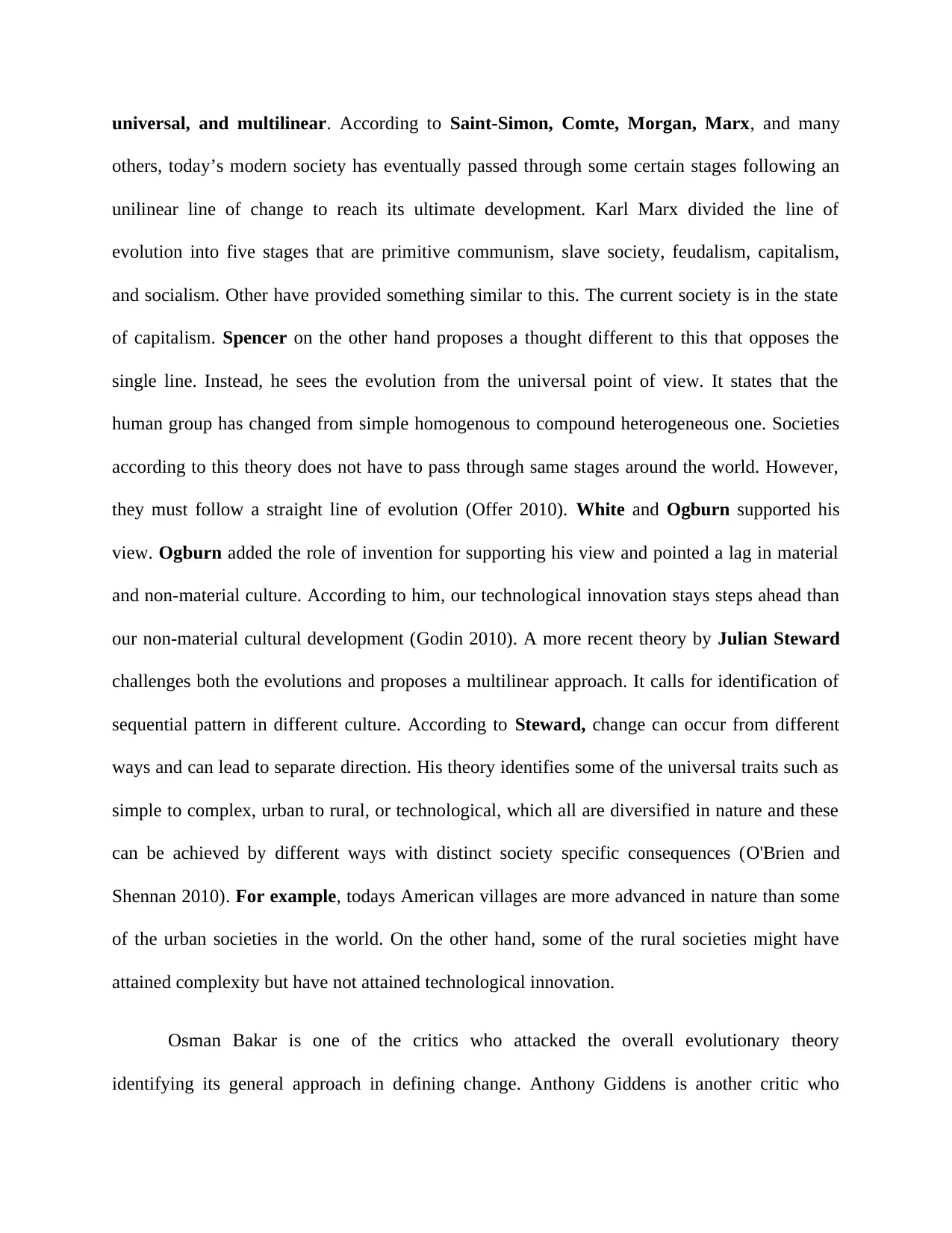
universal, and multilinear. According to Saint-Simon, Comte, Morgan, Marx, and many
others, today’s modern society has eventually passed through some certain stages following an
unilinear line of change to reach its ultimate development. Karl Marx divided the line of
evolution into five stages that are primitive communism, slave society, feudalism, capitalism,
and socialism. Other have provided something similar to this. The current society is in the state
of capitalism. Spencer on the other hand proposes a thought different to this that opposes the
single line. Instead, he sees the evolution from the universal point of view. It states that the
human group has changed from simple homogenous to compound heterogeneous one. Societies
according to this theory does not have to pass through same stages around the world. However,
they must follow a straight line of evolution (Offer 2010). White and Ogburn supported his
view. Ogburn added the role of invention for supporting his view and pointed a lag in material
and non-material culture. According to him, our technological innovation stays steps ahead than
our non-material cultural development (Godin 2010). A more recent theory by Julian Steward
challenges both the evolutions and proposes a multilinear approach. It calls for identification of
sequential pattern in different culture. According to Steward, change can occur from different
ways and can lead to separate direction. His theory identifies some of the universal traits such as
simple to complex, urban to rural, or technological, which all are diversified in nature and these
can be achieved by different ways with distinct society specific consequences (O'Brien and
Shennan 2010). For example, todays American villages are more advanced in nature than some
of the urban societies in the world. On the other hand, some of the rural societies might have
attained complexity but have not attained technological innovation.
Osman Bakar is one of the critics who attacked the overall evolutionary theory
identifying its general approach in defining change. Anthony Giddens is another critic who
others, today’s modern society has eventually passed through some certain stages following an
unilinear line of change to reach its ultimate development. Karl Marx divided the line of
evolution into five stages that are primitive communism, slave society, feudalism, capitalism,
and socialism. Other have provided something similar to this. The current society is in the state
of capitalism. Spencer on the other hand proposes a thought different to this that opposes the
single line. Instead, he sees the evolution from the universal point of view. It states that the
human group has changed from simple homogenous to compound heterogeneous one. Societies
according to this theory does not have to pass through same stages around the world. However,
they must follow a straight line of evolution (Offer 2010). White and Ogburn supported his
view. Ogburn added the role of invention for supporting his view and pointed a lag in material
and non-material culture. According to him, our technological innovation stays steps ahead than
our non-material cultural development (Godin 2010). A more recent theory by Julian Steward
challenges both the evolutions and proposes a multilinear approach. It calls for identification of
sequential pattern in different culture. According to Steward, change can occur from different
ways and can lead to separate direction. His theory identifies some of the universal traits such as
simple to complex, urban to rural, or technological, which all are diversified in nature and these
can be achieved by different ways with distinct society specific consequences (O'Brien and
Shennan 2010). For example, todays American villages are more advanced in nature than some
of the urban societies in the world. On the other hand, some of the rural societies might have
attained complexity but have not attained technological innovation.
Osman Bakar is one of the critics who attacked the overall evolutionary theory
identifying its general approach in defining change. Anthony Giddens is another critic who
Paraphrase This Document
Need a fresh take? Get an instant paraphrase of this document with our AI Paraphraser
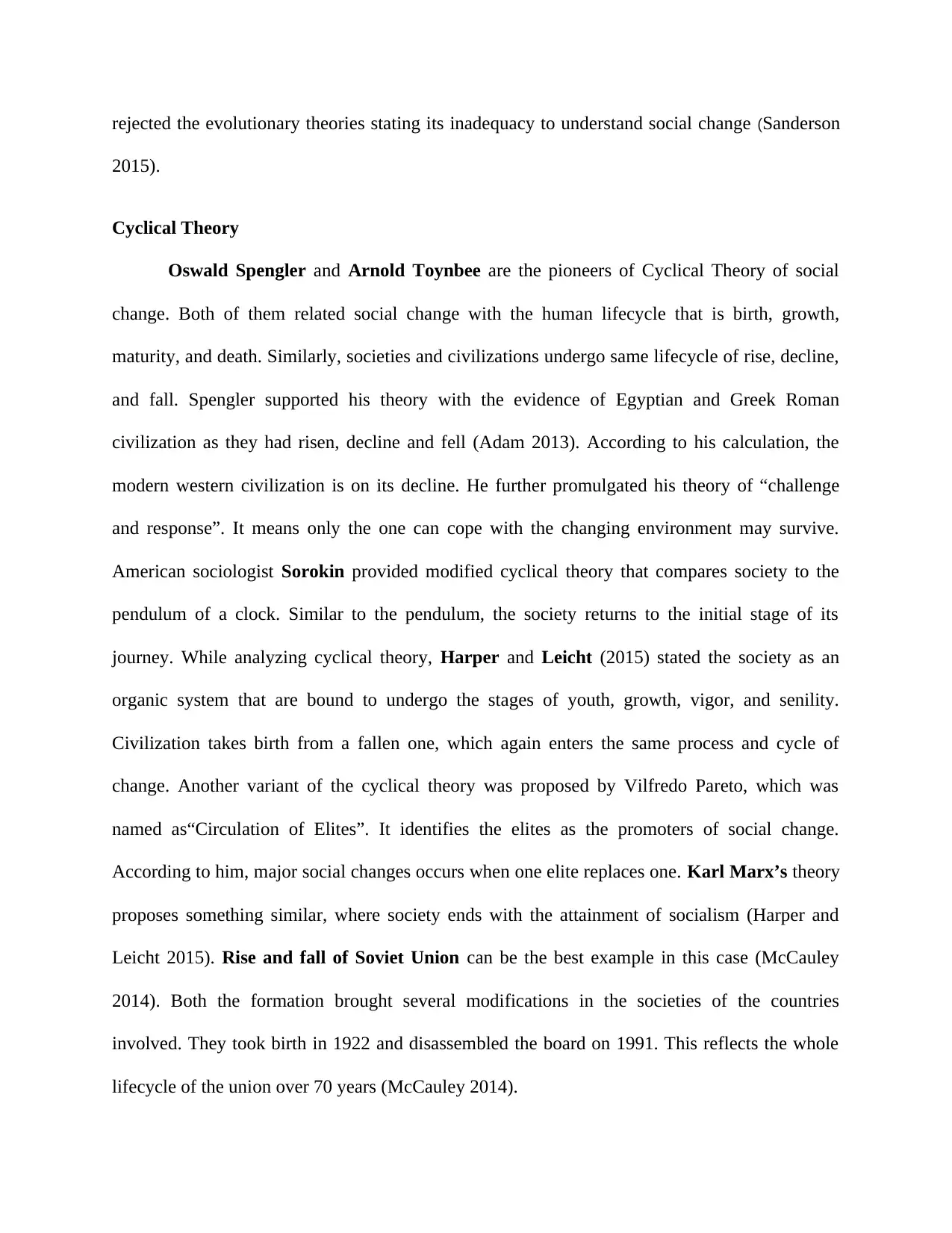
rejected the evolutionary theories stating its inadequacy to understand social change (Sanderson
2015).
Cyclical Theory
Oswald Spengler and Arnold Toynbee are the pioneers of Cyclical Theory of social
change. Both of them related social change with the human lifecycle that is birth, growth,
maturity, and death. Similarly, societies and civilizations undergo same lifecycle of rise, decline,
and fall. Spengler supported his theory with the evidence of Egyptian and Greek Roman
civilization as they had risen, decline and fell (Adam 2013). According to his calculation, the
modern western civilization is on its decline. He further promulgated his theory of “challenge
and response”. It means only the one can cope with the changing environment may survive.
American sociologist Sorokin provided modified cyclical theory that compares society to the
pendulum of a clock. Similar to the pendulum, the society returns to the initial stage of its
journey. While analyzing cyclical theory, Harper and Leicht (2015) stated the society as an
organic system that are bound to undergo the stages of youth, growth, vigor, and senility.
Civilization takes birth from a fallen one, which again enters the same process and cycle of
change. Another variant of the cyclical theory was proposed by Vilfredo Pareto, which was
named as“Circulation of Elites”. It identifies the elites as the promoters of social change.
According to him, major social changes occurs when one elite replaces one. Karl Marx’s theory
proposes something similar, where society ends with the attainment of socialism (Harper and
Leicht 2015). Rise and fall of Soviet Union can be the best example in this case (McCauley
2014). Both the formation brought several modifications in the societies of the countries
involved. They took birth in 1922 and disassembled the board on 1991. This reflects the whole
lifecycle of the union over 70 years (McCauley 2014).
2015).
Cyclical Theory
Oswald Spengler and Arnold Toynbee are the pioneers of Cyclical Theory of social
change. Both of them related social change with the human lifecycle that is birth, growth,
maturity, and death. Similarly, societies and civilizations undergo same lifecycle of rise, decline,
and fall. Spengler supported his theory with the evidence of Egyptian and Greek Roman
civilization as they had risen, decline and fell (Adam 2013). According to his calculation, the
modern western civilization is on its decline. He further promulgated his theory of “challenge
and response”. It means only the one can cope with the changing environment may survive.
American sociologist Sorokin provided modified cyclical theory that compares society to the
pendulum of a clock. Similar to the pendulum, the society returns to the initial stage of its
journey. While analyzing cyclical theory, Harper and Leicht (2015) stated the society as an
organic system that are bound to undergo the stages of youth, growth, vigor, and senility.
Civilization takes birth from a fallen one, which again enters the same process and cycle of
change. Another variant of the cyclical theory was proposed by Vilfredo Pareto, which was
named as“Circulation of Elites”. It identifies the elites as the promoters of social change.
According to him, major social changes occurs when one elite replaces one. Karl Marx’s theory
proposes something similar, where society ends with the attainment of socialism (Harper and
Leicht 2015). Rise and fall of Soviet Union can be the best example in this case (McCauley
2014). Both the formation brought several modifications in the societies of the countries
involved. They took birth in 1922 and disassembled the board on 1991. This reflects the whole
lifecycle of the union over 70 years (McCauley 2014).
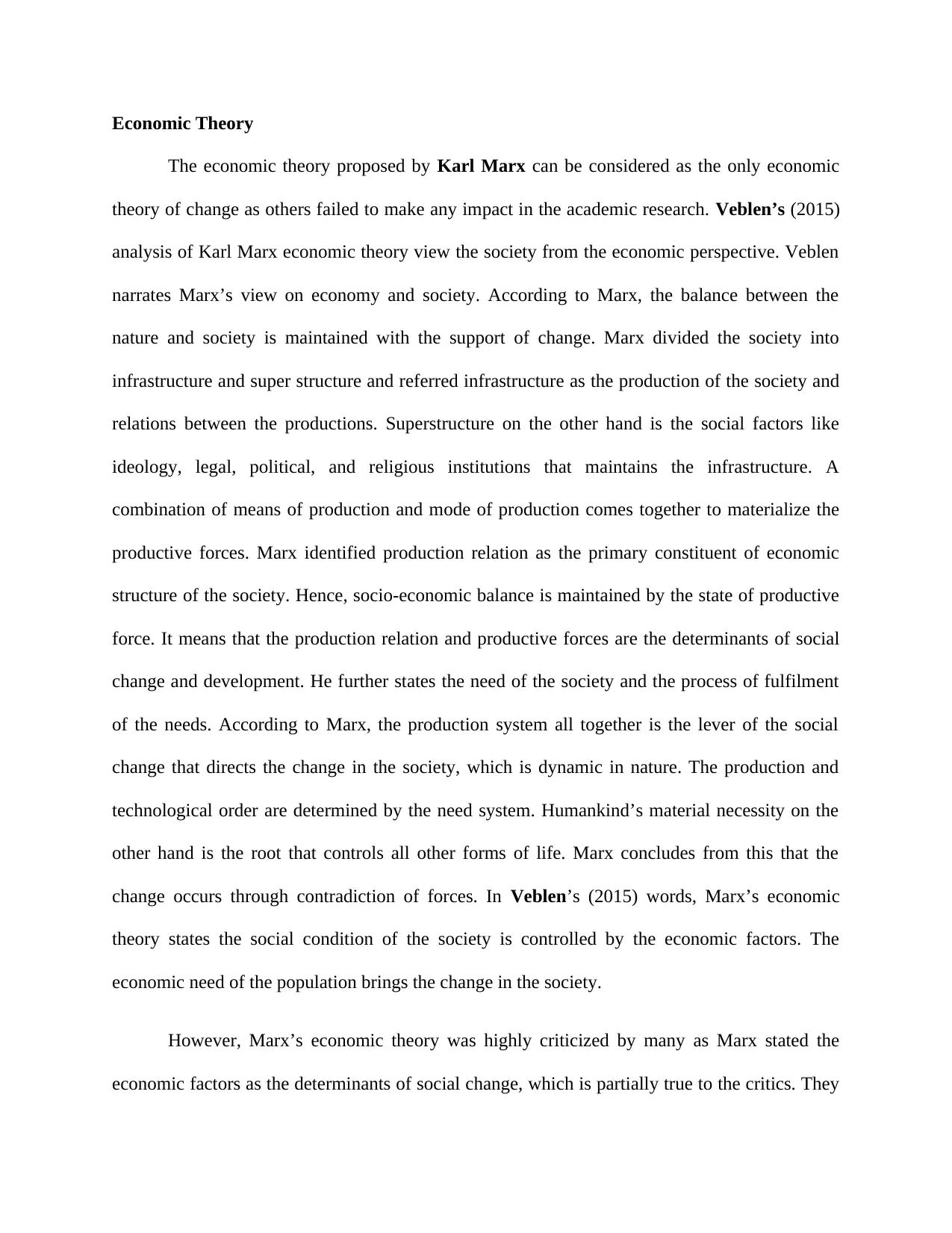
Economic Theory
The economic theory proposed by Karl Marx can be considered as the only economic
theory of change as others failed to make any impact in the academic research. Veblen’s (2015)
analysis of Karl Marx economic theory view the society from the economic perspective. Veblen
narrates Marx’s view on economy and society. According to Marx, the balance between the
nature and society is maintained with the support of change. Marx divided the society into
infrastructure and super structure and referred infrastructure as the production of the society and
relations between the productions. Superstructure on the other hand is the social factors like
ideology, legal, political, and religious institutions that maintains the infrastructure. A
combination of means of production and mode of production comes together to materialize the
productive forces. Marx identified production relation as the primary constituent of economic
structure of the society. Hence, socio-economic balance is maintained by the state of productive
force. It means that the production relation and productive forces are the determinants of social
change and development. He further states the need of the society and the process of fulfilment
of the needs. According to Marx, the production system all together is the lever of the social
change that directs the change in the society, which is dynamic in nature. The production and
technological order are determined by the need system. Humankind’s material necessity on the
other hand is the root that controls all other forms of life. Marx concludes from this that the
change occurs through contradiction of forces. In Veblen’s (2015) words, Marx’s economic
theory states the social condition of the society is controlled by the economic factors. The
economic need of the population brings the change in the society.
However, Marx’s economic theory was highly criticized by many as Marx stated the
economic factors as the determinants of social change, which is partially true to the critics. They
The economic theory proposed by Karl Marx can be considered as the only economic
theory of change as others failed to make any impact in the academic research. Veblen’s (2015)
analysis of Karl Marx economic theory view the society from the economic perspective. Veblen
narrates Marx’s view on economy and society. According to Marx, the balance between the
nature and society is maintained with the support of change. Marx divided the society into
infrastructure and super structure and referred infrastructure as the production of the society and
relations between the productions. Superstructure on the other hand is the social factors like
ideology, legal, political, and religious institutions that maintains the infrastructure. A
combination of means of production and mode of production comes together to materialize the
productive forces. Marx identified production relation as the primary constituent of economic
structure of the society. Hence, socio-economic balance is maintained by the state of productive
force. It means that the production relation and productive forces are the determinants of social
change and development. He further states the need of the society and the process of fulfilment
of the needs. According to Marx, the production system all together is the lever of the social
change that directs the change in the society, which is dynamic in nature. The production and
technological order are determined by the need system. Humankind’s material necessity on the
other hand is the root that controls all other forms of life. Marx concludes from this that the
change occurs through contradiction of forces. In Veblen’s (2015) words, Marx’s economic
theory states the social condition of the society is controlled by the economic factors. The
economic need of the population brings the change in the society.
However, Marx’s economic theory was highly criticized by many as Marx stated the
economic factors as the determinants of social change, which is partially true to the critics. They
⊘ This is a preview!⊘
Do you want full access?
Subscribe today to unlock all pages.

Trusted by 1+ million students worldwide
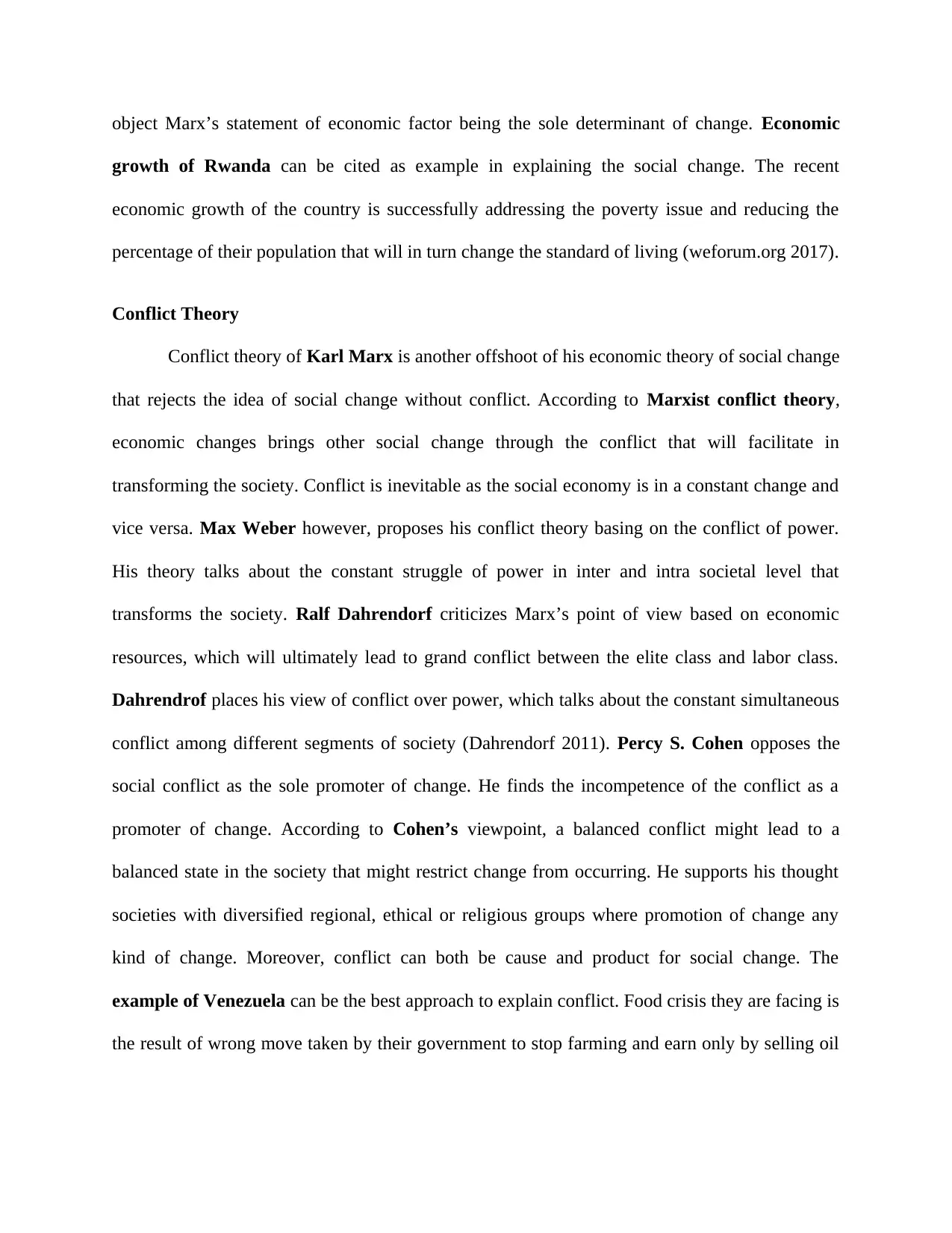
object Marx’s statement of economic factor being the sole determinant of change. Economic
growth of Rwanda can be cited as example in explaining the social change. The recent
economic growth of the country is successfully addressing the poverty issue and reducing the
percentage of their population that will in turn change the standard of living (weforum.org 2017).
Conflict Theory
Conflict theory of Karl Marx is another offshoot of his economic theory of social change
that rejects the idea of social change without conflict. According to Marxist conflict theory,
economic changes brings other social change through the conflict that will facilitate in
transforming the society. Conflict is inevitable as the social economy is in a constant change and
vice versa. Max Weber however, proposes his conflict theory basing on the conflict of power.
His theory talks about the constant struggle of power in inter and intra societal level that
transforms the society. Ralf Dahrendorf criticizes Marx’s point of view based on economic
resources, which will ultimately lead to grand conflict between the elite class and labor class.
Dahrendrof places his view of conflict over power, which talks about the constant simultaneous
conflict among different segments of society (Dahrendorf 2011). Percy S. Cohen opposes the
social conflict as the sole promoter of change. He finds the incompetence of the conflict as a
promoter of change. According to Cohen’s viewpoint, a balanced conflict might lead to a
balanced state in the society that might restrict change from occurring. He supports his thought
societies with diversified regional, ethical or religious groups where promotion of change any
kind of change. Moreover, conflict can both be cause and product for social change. The
example of Venezuela can be the best approach to explain conflict. Food crisis they are facing is
the result of wrong move taken by their government to stop farming and earn only by selling oil
growth of Rwanda can be cited as example in explaining the social change. The recent
economic growth of the country is successfully addressing the poverty issue and reducing the
percentage of their population that will in turn change the standard of living (weforum.org 2017).
Conflict Theory
Conflict theory of Karl Marx is another offshoot of his economic theory of social change
that rejects the idea of social change without conflict. According to Marxist conflict theory,
economic changes brings other social change through the conflict that will facilitate in
transforming the society. Conflict is inevitable as the social economy is in a constant change and
vice versa. Max Weber however, proposes his conflict theory basing on the conflict of power.
His theory talks about the constant struggle of power in inter and intra societal level that
transforms the society. Ralf Dahrendorf criticizes Marx’s point of view based on economic
resources, which will ultimately lead to grand conflict between the elite class and labor class.
Dahrendrof places his view of conflict over power, which talks about the constant simultaneous
conflict among different segments of society (Dahrendorf 2011). Percy S. Cohen opposes the
social conflict as the sole promoter of change. He finds the incompetence of the conflict as a
promoter of change. According to Cohen’s viewpoint, a balanced conflict might lead to a
balanced state in the society that might restrict change from occurring. He supports his thought
societies with diversified regional, ethical or religious groups where promotion of change any
kind of change. Moreover, conflict can both be cause and product for social change. The
example of Venezuela can be the best approach to explain conflict. Food crisis they are facing is
the result of wrong move taken by their government to stop farming and earn only by selling oil
Paraphrase This Document
Need a fresh take? Get an instant paraphrase of this document with our AI Paraphraser
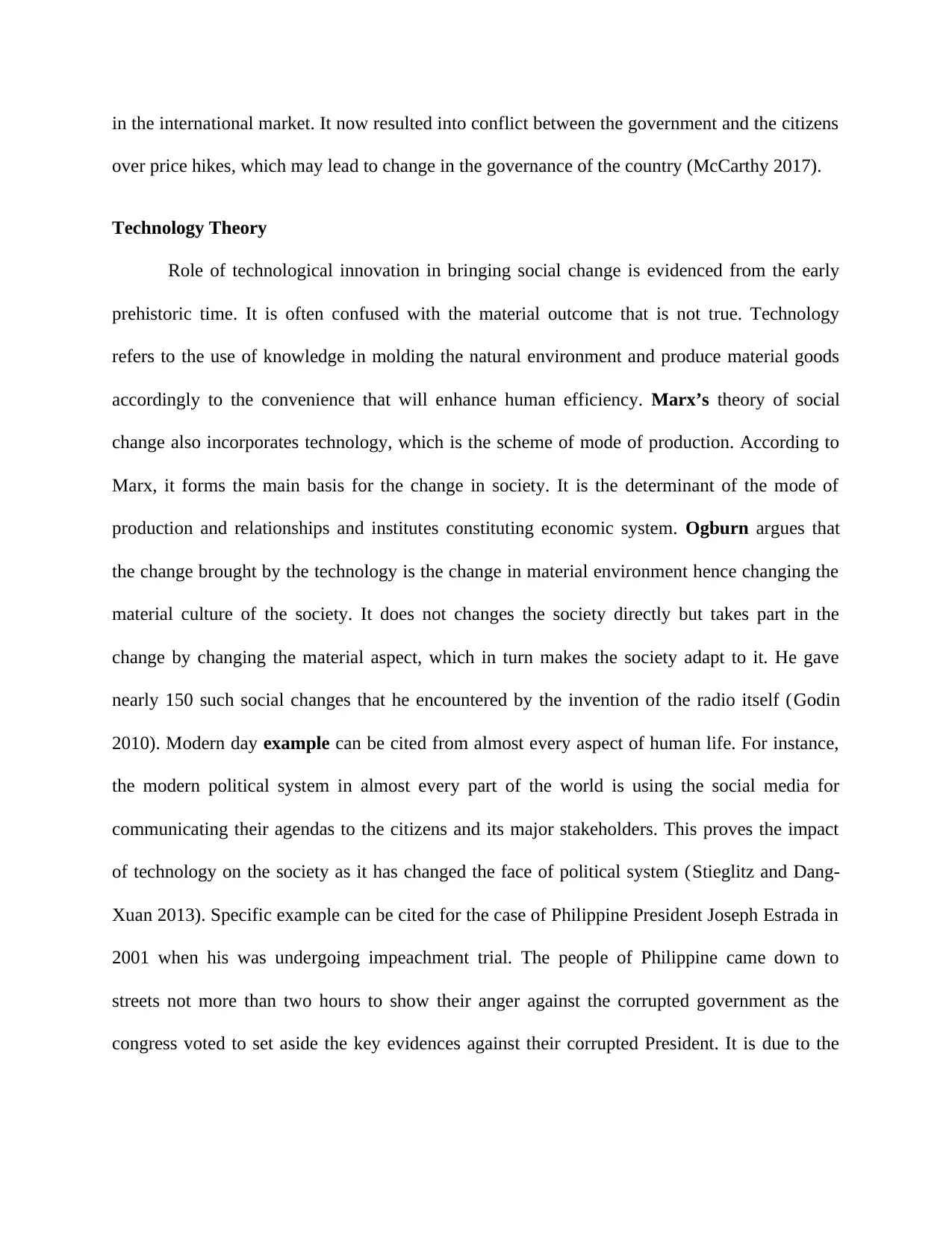
in the international market. It now resulted into conflict between the government and the citizens
over price hikes, which may lead to change in the governance of the country (McCarthy 2017).
Technology Theory
Role of technological innovation in bringing social change is evidenced from the early
prehistoric time. It is often confused with the material outcome that is not true. Technology
refers to the use of knowledge in molding the natural environment and produce material goods
accordingly to the convenience that will enhance human efficiency. Marx’s theory of social
change also incorporates technology, which is the scheme of mode of production. According to
Marx, it forms the main basis for the change in society. It is the determinant of the mode of
production and relationships and institutes constituting economic system. Ogburn argues that
the change brought by the technology is the change in material environment hence changing the
material culture of the society. It does not changes the society directly but takes part in the
change by changing the material aspect, which in turn makes the society adapt to it. He gave
nearly 150 such social changes that he encountered by the invention of the radio itself (Godin
2010). Modern day example can be cited from almost every aspect of human life. For instance,
the modern political system in almost every part of the world is using the social media for
communicating their agendas to the citizens and its major stakeholders. This proves the impact
of technology on the society as it has changed the face of political system (Stieglitz and Dang-
Xuan 2013). Specific example can be cited for the case of Philippine President Joseph Estrada in
2001 when his was undergoing impeachment trial. The people of Philippine came down to
streets not more than two hours to show their anger against the corrupted government as the
congress voted to set aside the key evidences against their corrupted President. It is due to the
over price hikes, which may lead to change in the governance of the country (McCarthy 2017).
Technology Theory
Role of technological innovation in bringing social change is evidenced from the early
prehistoric time. It is often confused with the material outcome that is not true. Technology
refers to the use of knowledge in molding the natural environment and produce material goods
accordingly to the convenience that will enhance human efficiency. Marx’s theory of social
change also incorporates technology, which is the scheme of mode of production. According to
Marx, it forms the main basis for the change in society. It is the determinant of the mode of
production and relationships and institutes constituting economic system. Ogburn argues that
the change brought by the technology is the change in material environment hence changing the
material culture of the society. It does not changes the society directly but takes part in the
change by changing the material aspect, which in turn makes the society adapt to it. He gave
nearly 150 such social changes that he encountered by the invention of the radio itself (Godin
2010). Modern day example can be cited from almost every aspect of human life. For instance,
the modern political system in almost every part of the world is using the social media for
communicating their agendas to the citizens and its major stakeholders. This proves the impact
of technology on the society as it has changed the face of political system (Stieglitz and Dang-
Xuan 2013). Specific example can be cited for the case of Philippine President Joseph Estrada in
2001 when his was undergoing impeachment trial. The people of Philippine came down to
streets not more than two hours to show their anger against the corrupted government as the
congress voted to set aside the key evidences against their corrupted President. It is due to the
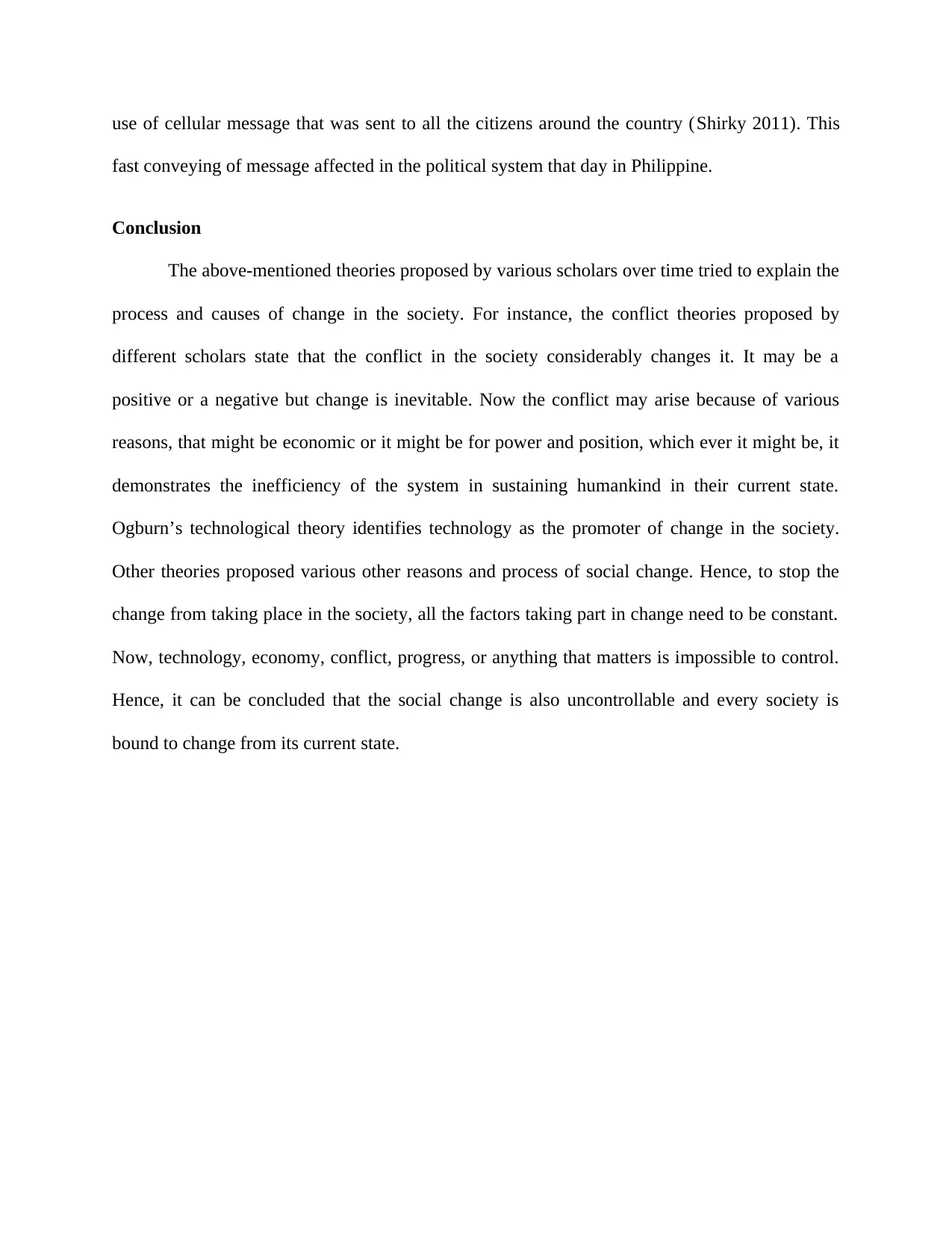
use of cellular message that was sent to all the citizens around the country (Shirky 2011). This
fast conveying of message affected in the political system that day in Philippine.
Conclusion
The above-mentioned theories proposed by various scholars over time tried to explain the
process and causes of change in the society. For instance, the conflict theories proposed by
different scholars state that the conflict in the society considerably changes it. It may be a
positive or a negative but change is inevitable. Now the conflict may arise because of various
reasons, that might be economic or it might be for power and position, which ever it might be, it
demonstrates the inefficiency of the system in sustaining humankind in their current state.
Ogburn’s technological theory identifies technology as the promoter of change in the society.
Other theories proposed various other reasons and process of social change. Hence, to stop the
change from taking place in the society, all the factors taking part in change need to be constant.
Now, technology, economy, conflict, progress, or anything that matters is impossible to control.
Hence, it can be concluded that the social change is also uncontrollable and every society is
bound to change from its current state.
fast conveying of message affected in the political system that day in Philippine.
Conclusion
The above-mentioned theories proposed by various scholars over time tried to explain the
process and causes of change in the society. For instance, the conflict theories proposed by
different scholars state that the conflict in the society considerably changes it. It may be a
positive or a negative but change is inevitable. Now the conflict may arise because of various
reasons, that might be economic or it might be for power and position, which ever it might be, it
demonstrates the inefficiency of the system in sustaining humankind in their current state.
Ogburn’s technological theory identifies technology as the promoter of change in the society.
Other theories proposed various other reasons and process of social change. Hence, to stop the
change from taking place in the society, all the factors taking part in change need to be constant.
Now, technology, economy, conflict, progress, or anything that matters is impossible to control.
Hence, it can be concluded that the social change is also uncontrollable and every society is
bound to change from its current state.
⊘ This is a preview!⊘
Do you want full access?
Subscribe today to unlock all pages.

Trusted by 1+ million students worldwide
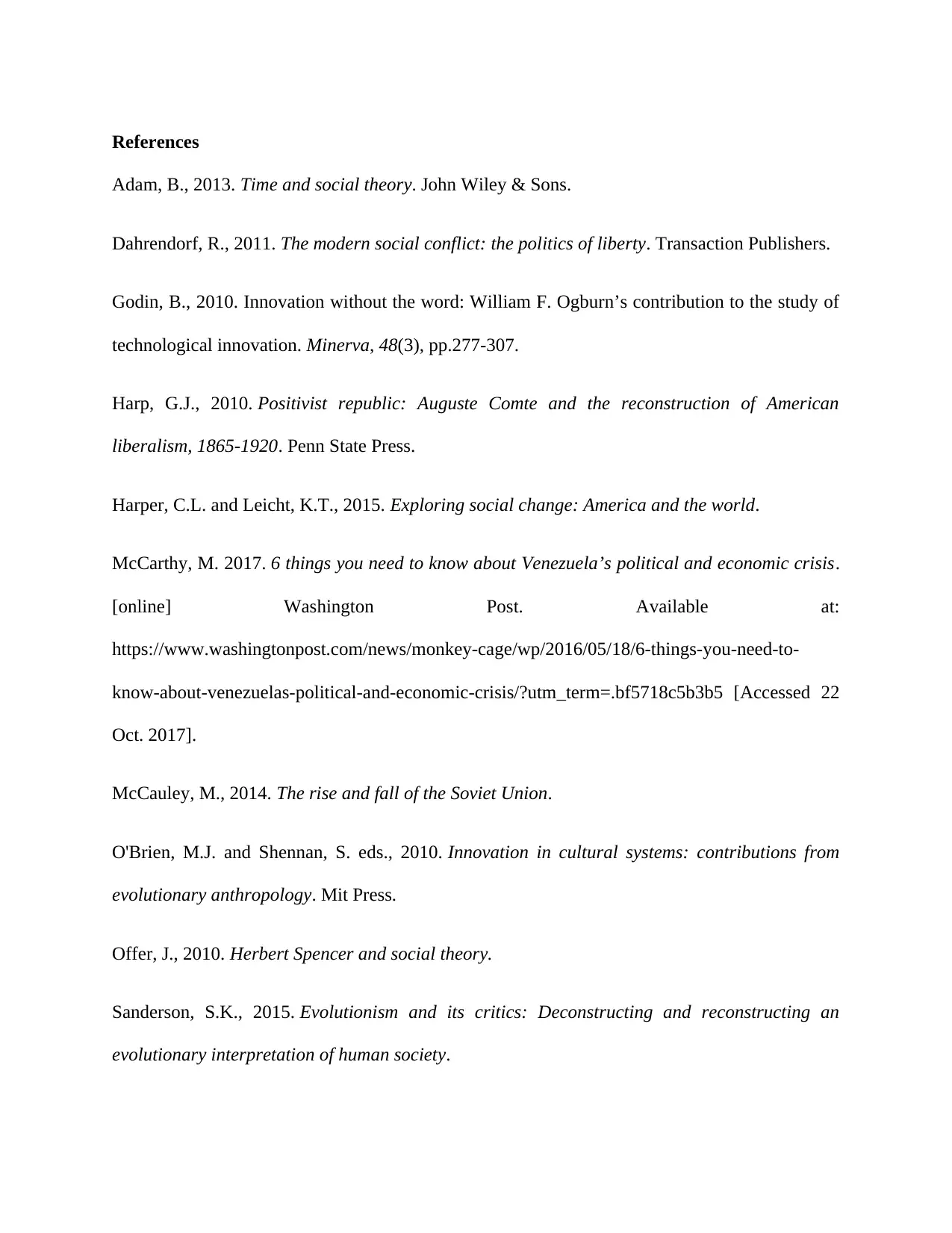
References
Adam, B., 2013. Time and social theory. John Wiley & Sons.
Dahrendorf, R., 2011. The modern social conflict: the politics of liberty. Transaction Publishers.
Godin, B., 2010. Innovation without the word: William F. Ogburn’s contribution to the study of
technological innovation. Minerva, 48(3), pp.277-307.
Harp, G.J., 2010. Positivist republic: Auguste Comte and the reconstruction of American
liberalism, 1865-1920. Penn State Press.
Harper, C.L. and Leicht, K.T., 2015. Exploring social change: America and the world.
McCarthy, M. 2017. 6 things you need to know about Venezuela’s political and economic crisis.
[online] Washington Post. Available at:
https://www.washingtonpost.com/news/monkey-cage/wp/2016/05/18/6-things-you-need-to-
know-about-venezuelas-political-and-economic-crisis/?utm_term=.bf5718c5b3b5 [Accessed 22
Oct. 2017].
McCauley, M., 2014. The rise and fall of the Soviet Union.
O'Brien, M.J. and Shennan, S. eds., 2010. Innovation in cultural systems: contributions from
evolutionary anthropology. Mit Press.
Offer, J., 2010. Herbert Spencer and social theory.
Sanderson, S.K., 2015. Evolutionism and its critics: Deconstructing and reconstructing an
evolutionary interpretation of human society.
Adam, B., 2013. Time and social theory. John Wiley & Sons.
Dahrendorf, R., 2011. The modern social conflict: the politics of liberty. Transaction Publishers.
Godin, B., 2010. Innovation without the word: William F. Ogburn’s contribution to the study of
technological innovation. Minerva, 48(3), pp.277-307.
Harp, G.J., 2010. Positivist republic: Auguste Comte and the reconstruction of American
liberalism, 1865-1920. Penn State Press.
Harper, C.L. and Leicht, K.T., 2015. Exploring social change: America and the world.
McCarthy, M. 2017. 6 things you need to know about Venezuela’s political and economic crisis.
[online] Washington Post. Available at:
https://www.washingtonpost.com/news/monkey-cage/wp/2016/05/18/6-things-you-need-to-
know-about-venezuelas-political-and-economic-crisis/?utm_term=.bf5718c5b3b5 [Accessed 22
Oct. 2017].
McCauley, M., 2014. The rise and fall of the Soviet Union.
O'Brien, M.J. and Shennan, S. eds., 2010. Innovation in cultural systems: contributions from
evolutionary anthropology. Mit Press.
Offer, J., 2010. Herbert Spencer and social theory.
Sanderson, S.K., 2015. Evolutionism and its critics: Deconstructing and reconstructing an
evolutionary interpretation of human society.
Paraphrase This Document
Need a fresh take? Get an instant paraphrase of this document with our AI Paraphraser
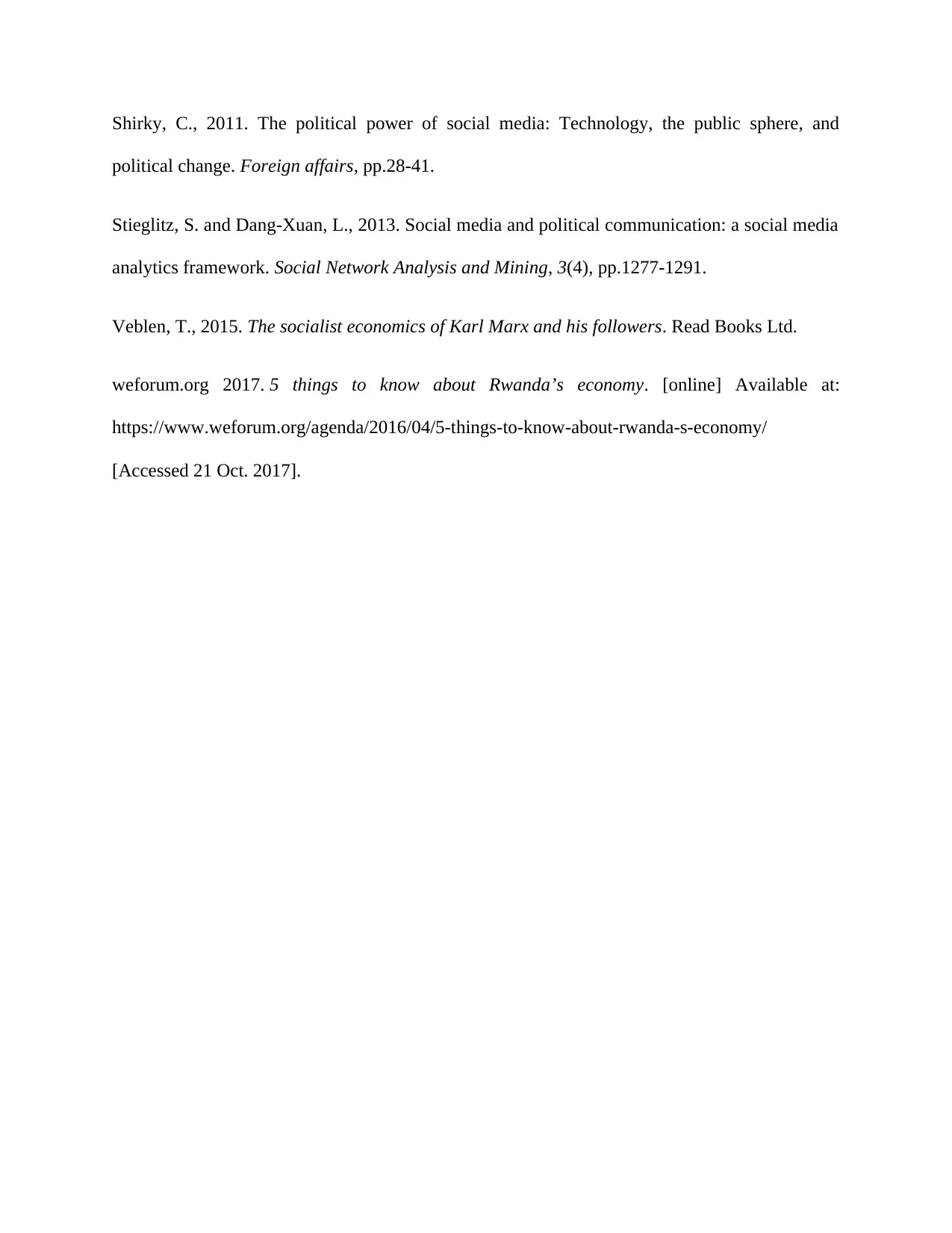
Shirky, C., 2011. The political power of social media: Technology, the public sphere, and
political change. Foreign affairs, pp.28-41.
Stieglitz, S. and Dang-Xuan, L., 2013. Social media and political communication: a social media
analytics framework. Social Network Analysis and Mining, 3(4), pp.1277-1291.
Veblen, T., 2015. The socialist economics of Karl Marx and his followers. Read Books Ltd.
weforum.org 2017. 5 things to know about Rwanda’s economy. [online] Available at:
https://www.weforum.org/agenda/2016/04/5-things-to-know-about-rwanda-s-economy/
[Accessed 21 Oct. 2017].
political change. Foreign affairs, pp.28-41.
Stieglitz, S. and Dang-Xuan, L., 2013. Social media and political communication: a social media
analytics framework. Social Network Analysis and Mining, 3(4), pp.1277-1291.
Veblen, T., 2015. The socialist economics of Karl Marx and his followers. Read Books Ltd.
weforum.org 2017. 5 things to know about Rwanda’s economy. [online] Available at:
https://www.weforum.org/agenda/2016/04/5-things-to-know-about-rwanda-s-economy/
[Accessed 21 Oct. 2017].
1 out of 11
Your All-in-One AI-Powered Toolkit for Academic Success.
+13062052269
info@desklib.com
Available 24*7 on WhatsApp / Email
![[object Object]](/_next/static/media/star-bottom.7253800d.svg)
Unlock your academic potential
Copyright © 2020–2026 A2Z Services. All Rights Reserved. Developed and managed by ZUCOL.


